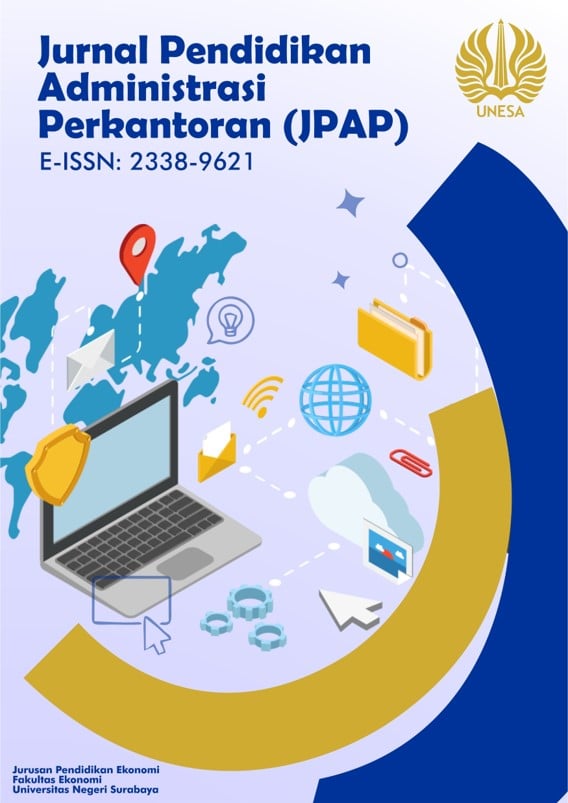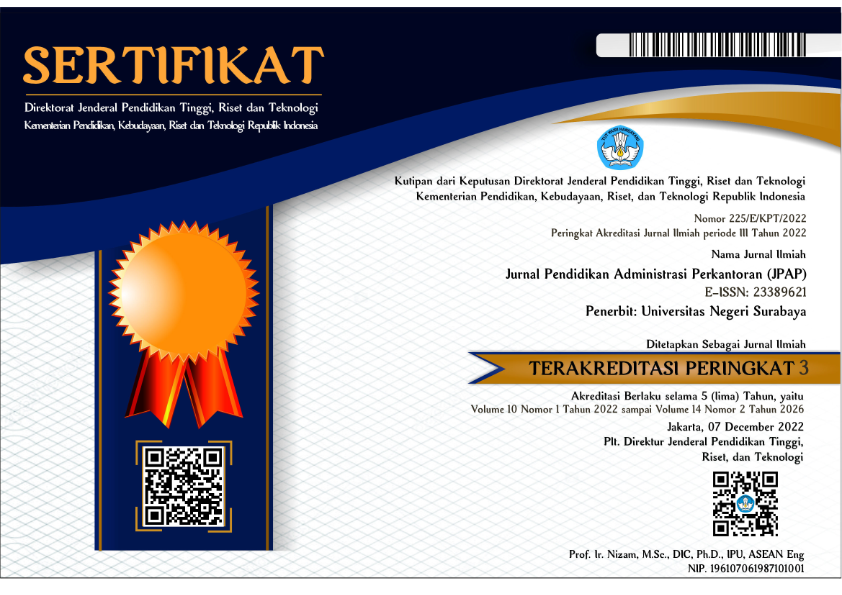Pengaruh Model Pembelajaran Problem Based Learning (PBL) Terhadap Kemampuan Berpikir Kritis dan Hasil Belajar Peserta Didik Pada Mata Pelajaran Kearsipan Kelas X OTKP Di SMK Negeri 1 Sooko Mojokerto
DOI:
https://doi.org/10.26740/jpap.v8n1.p47-55Keywords:
Critical Thinking Skill, Learning Outcome, Problem Based Learning (PBL)Abstract
The purpose of this research to determine that the effect of the Problem Based Learning (PBL) learning model on critical thinking skills of class X SMKN 1 Sooko Mojokerto, to determine that the effect of Problem Based Learning (PBL) learning model on learning outcomes of class X SMKN 1 Sooko Mojokerto, to determine the implementing of Problem Based Learning (PBL) learning model to the basic competence in implementing maintance procedures archive at SMKN 1 Sooko Mojokerto in academic year 2019/2020. This the research design that used was quasi experimental with method non-equivalent control group design. The research were all students of class X OTKP 2 and X OTP 3 and class X OTKP 3 as the control class and X OTKP 2 as the experimental class. The instrument that used was a critical thinking skill test and multiples choice test to measure student learning outcomes and the technique pf anlizing, data used homogeneity test, normality test, gain score analysis, and t test (hypotesis). The result indicate that the Problem Based Learning (PBL) learning model had a significant effect on critical thinking skills as evidence by the acquisition of t-test with a significant level of 0.000 (0,00) < 0,05. The result also showed that the Problem Based Learning (PBL) learning model has a significant effect on student learning outcome as evidence by the acquisition with a significance level of 0.000 (0,00) < 0,05. In addition, the experimental class has an average of critical thinking skilss higher than the control class with the conventional learning model with an average of 83 experimental classes and 72 control classes. On the average of posttest learning outcome the experimental class has an average higher than control with an experimental average of 85,29 and control class of 74,85. So it was concluded that Problem Based Learning (PBL) learning model had an influence the crtical thinking skill an learning outcomes of students of class X OTKP SMKN 1 Sooko Mojokerto.
References
Aidoo, B., et al. (2016). Effect of Problem-Based Learning on Students Achievement in Chemistry. Journal of Education and Practice, 7(33), 103-108.
Al-Tabany, T. I. B. (2014). Mendesain Model Pembelajaran Inovatif, Progresif, dan Kontekstual. Jakarta: Prenada Media Group.
Apriliatin, P. & Dewi, R. M. (2016). Pengaruh Model Problem Based Learning (PBL) terhadap Aktivitas dan Hasil Belajar Siswa. Jurnal Pendidikan Ekonomi (JUPE), 4(3), 111.
Bashith, A. & Amin, S. (2017). The Effect of Problem Based Learning on EFL Students Critical Thinking Skill and Learning Outcome. Al-Ta Lim Journal, 24(2), 93.
Dakabesi, D., Supiah, I., & Luoise, Y. (2019). The Effect of Problem Based Learning Model on Critical Thinking Skills in The Context of Chemical Reaction Rate. Journal of Education and Learning (EduLearn), 13(3), 395-401.
Dewi, E. K. & Jatiningsih, O. (2015). Pengaruh Penggunaan Model Pembelajaran Problem Based Learning terhadap Kemampuan Berpikir Kritis Siswa pada Mata Pelajaran PPKn Kelas X SMAN 22 Surabaya. Kajian Moral dan Kewarganegaraan, 02(03), 936950.
Fathurrohman, M. (2015). Model-Model Pembelajaran Inovatif. Jogjakarta: Ar-ruzz Media.
Hamalik, O. (2014). Kurikulum dan Pembelajaran. Jakarta: Bumi Aksara.
Jhonson, E. B. (2011). Contextual Teaching & Learning Menjadikan Proses Belajar-Mengajar Mengasyikan dan Bermakna. Bandung: Kaifa.
Mazidah, S. & Puspasari, D. (2018). Penerapan Model Pembelajaran Problem Based Learning (PBL) Terhadap Hasil Belajar Siswa Kelas X OTKP Pada Mata Pelajaran Korespondensi Di SMK Yasmu Gresik. Jurnal Pendidikan Administrasi Perkantoran, 07(02), 2631.
Mujiono, A. & Endryansyah. (2015). Pengaruh Model Problem Based Learning terhadap Hasil Belajar Siswa pada Mata Pelajaran Instalasi Motor Listrik di SMKN 7 Surabaya. Jurnal Pendidikan Teknik Elektro, 04(02), 359-365.
Siregar, E. & Nara, H. (2015). Teori Belajar dan Pembelajaran. Bogor: Ghalia Indonesia.
Slameto. (2013). Belajar dan Faktor-faktor yang Mempengaruhinya. Jakarta: Rineka Cipta.
Sudjana, N. (2009). Penilaian Hasil Proses Belajar Mengajar. Bandung: PT Remaja Rosdakarya.
Suprijono, A. (2009). Cooperatif Learning Teori & Aplikasi Paikem. Yogjakarta: Pustaka Pelajar.
 Abstract views: 4697
,
Abstract views: 4697
, PDF Downloads: 5291
PDF Downloads: 5291










